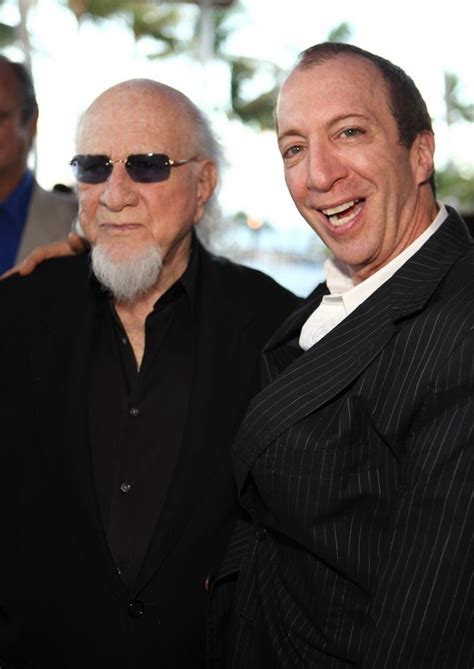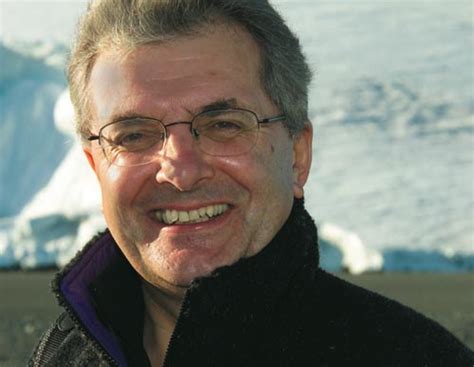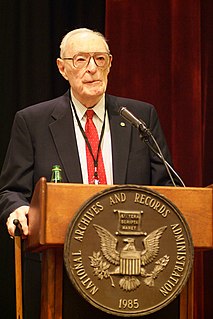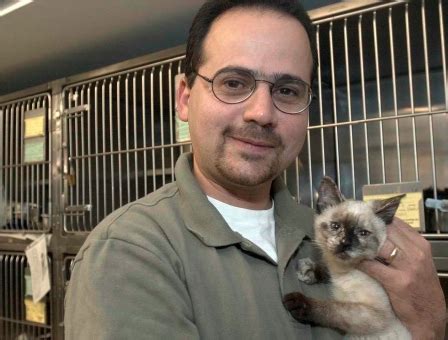Top 586 Reducing Quotes & Sayings - Page 10
Explore popular Reducing quotes.
Last updated on December 22, 2024.
The modern way with God is to set him at a distance, if not to deny him altogether; and the irony is that modern Christians, preoccupied with maintaining religious practices in an irreligous world, have themselves allowed God to become remote...for churchmen who look at God through the wrong end of the telescope, so reducing him to pigmy proportions, cannot hope to end up as more than pigmy Christians.
Get out of debt. In a world of stagnant incomes and rising core expenses like mortgage and health care costs, that's a lot easier said than done. The middle class is under enormous pressure. But families can stop the bleeding by reducing their reliance on debt wherever they can. They can also start fighting back by taking a hard look at whom they do business with and rethinking whether they want tricks-and-traps banks to hold their money. They can also demand that public officials take the side of families over the side of banks.
The hardest thing was going through different stages of weight loss. At the beginning, it was easy to take off the weight with exercise and eating less but then you reach a point where 90 per cent of the weight loss is achieved purely through reducing your calorie intake. My goal was to lose four pounds per week. That worked well for the first few months but then things got tricky.
The experience curve says that your costs should probably decline by 15% or 20% with every doubling in your experience making a product, approximately how many of them you turn out. It also says that if you have the biggest market share, meaning the most experience of anybody in your competitive set, you should have the lowest costs, and the resultant capability to underprice your competitors, maybe forever. The abiding lesson of the experience curve is that companies need to discipline themselves to keep reducing their costs, year in, year out, if they are to remain competitive.
The music business is suffering because fewer artists are being invested in. Labels are putting in less money, taking fewer risks and signing half as many artists as they did 10 years ago. Everything is risk averse right now and there are two ways to deal with a business situation like this: either reduce your risk or increase your return. They're reducing their risk to the bone and looking for ways with their 360 deals to increase their return. They're still not making money. Artists are suffering. Labels, or music investors, are suffering.
[The Republicans] offer . . . a detailed agenda for national renewal. . . . [On] reducing illegitimacy . . . the state will use . . . funds for programs to reduce out-of-wedlock pregnancies, to promote adoption, to establish and operate children's group homes, to establish and operate residential group homes for unwed mothers, or for any purpose the state deems appropriate. None of the taxpayer funds may be used for abortion services or abortion counseling.
Soul one might say is more imperfectly infinite than spirit, because soul tends to abolish the ego-consciousness that it absorbs or overwhelms, reducing its particularizing structure to pure sublime feeling (immediacy); but spirit is more successfully infinite than soul, even though also more difficult and abstruse, because it digests the functions of consciousness into itself and thus preserves and deploys the senses and intelligence of conscious ego to higher ends.
[Aldous Huxley] compared the brain to a 'reducing valve'. In ordinary perception, the senses send an overwhelming flood of information to the brain, which the brain then filters down to a trickle it can manage for the purpose of survival in a highly competitive world. Man has become so rational, so utilitarian, that the trickle becomes most pale and thin. It is efficient, for mere survival, but it screens out the most wondrous part of man's potential experience without his even knowing it. We're shut off from our own world.
Even in New York City, we've seen some major improvements from the way the system was 20 years ago. There's still a lot to do - we know that training workers and parents, reducing caseload size, developing therapeutic foster care, strengthening kinship care, and putting more emphasis into preventive care are all solutions. Unfortunately, if a child is in a situation where removal from the home becomes neccessary, there's already been trauma. Putting a traumatized child into a "system," not a home, with strangers is creating a perfect storm for further trauma.
It is important that Miers not be confirmed unless, in her 61st year, she suddenly and unexpectedly is found to have hitherto undisclosed interests and talents pertinent to the court's role. Otherwise the sound principle of substantial deference to a president's choice of judicial nominees will dissolve into a rationalization for senatorial abdication of the duty to hold presidents to some standards of seriousness that will prevent them from reducing the Supreme Court to a private plaything useful for fulfilling whims on behalf of friends.
Economist Frederick Thayer has studied the history of our balanced-budget crusades and has come up with some depressing statistics. We have had six major depressions in our history (1819, 1837, 1857, 1873, 1893 and 1929); all six of them followed sustained periods of reducing the national debt. We have had almost chronic deficits since the 1930s, and there has been no depression since then - the longest crash-free period in our history.
Dostoevsky wrote fiction about identity, moral value, death, will, sexual vs. spiritual love, greed, freedom, obsession, reason, faith, suicide. And he did it without ever reducing his characters to mouthpieces or his books to tracts. His concern was always what it is to be a human being—that is, how to be an actual *person*, someone whose life is informed by values and principles, instead of just an especially shrewd kind of self-preserving animal.
You can think of the Health Impact Fund as a mechanism that would keep the benefits and burdens of pharmaceutical innovation for the affluent roughly as they are while massively reducing the burdens presently imposed upon the poor. This sounds like magic. But it really works because the current system is not Pareto efficient. It's a system that generates hundreds of billions of dollars in litigation costs and deadweight losses that HIF-registered medicines would sidestep. By avoiding these losses, the HIF reform can bring improvements all around - including for pharmaceutical innovators.
Wealth from trade was the mainspring of Western material advance; the visible agents of change were great guns. These came of age in Europe in the 15th century. On land their potency in reducing castle walls favoured central over local power, since in general only monarchs could afford siege-trains; so nation-states were consolidated and extended into great territorial empires. At sea, guns transformed sailing ships into mobile castles virtually impregnable to opponents who lacked equally powerful ordnance. With the ocean-going gunned warship, western Europe began to extend around the globe.
I realize that the 2020s are going to be completely different than this decade has been. There's going to be rapid progress. One of the most important aspects is going to be cheaper access to space. It changes everything. We have the ideas and the technology to do a lot of things, but we're limited financially, so, by reducing the cost of access to space, the whole problem is changed. Ultimately, the pieces that are coming together are going to allow us to send humans to Mars - and bring them back.
The diversity of mankind is a basic postulate of our knowledge of human beings. But if mankind is diverse and individuated, then how can anyone propose equality as an ideal? Every year, scholars hold Conferences on Equality and call for greater equality, and no one challenges the basic tenet. But what justification can equality find in the nature of man? If each individual is unique, how else can he be made 'equal' to others than by destroying most of what is human in him and reducing human society to the mindless uniformity of the ant heap?
The first beneficiary of compassion is always oneself. When compassion, or warmheartedness, arises in us and our focus shifts away from our own narrow self-interest, it is as if we open an inner door. It reduces fear, boosts confidence and brings us inner strength. By reducing distrust, it opens us to others and brings us a sense of connection to others, and sense of purpose and meaning in life.
A wife, if she is very generous, may allow that her husband lives up to perhaps eighty percent of her expectations. There is always the other twenty percent that she would like to change, and she may chip away at it for the whole of their married life without reducing it by very much. She may, on the other hand, simply decide to enjoy the eighty percent, and both of them will be happy.
Motorcycle manufacturer Harley-Davidson is a prime example of an American company that uses employment conditions to boost productivity. Current CEO James Ziemer - who started with the company while in high school has negotiated imaginative contracts with the unions representing Harley's workers, agreeing to keep production in the U.S. in exchange for constantly reducing total labor costs through automating tasks and changing work rules. Because Harley regularly reassigns workers whose tasks have been automated to other parts of the company.
Listing the polar bear under the Endangered Species Act could harm bear conservation efforts by eliminating revenues from the carefully-regulated sport hunting of polar bears by Americans and the importation of polar bear meat and trophies into the U.S. As hunting by non-Americans would replace hunting by Americans, nothing would be accomplished in terms of reducing the number of polar bears killed, but the revenue currently generated by American sport hunters for conservation and research efforts would be eliminated.
Our confused wish finds expression in the confused question as to the nature of force and electricity. But the answer which we want is not really an answer to this question. It is not by finding out more and fresh relations and connections that it can be answered; but by removing the contradictions existing between those already known, and thus perhaps by reducing their number. When these painful contradictions are removed, the question as to the nature of force will not have been answered; but our minds, no longer vexed, will cease to ask illegitimate questions.
While the repression of a memory is a psychological process, the suppression of feeling is accomplished by deadening a part of the body or reducing its motility so that feeling is diminished. The repression of the memory is dependent upon and related to the suppression of feeling, for as long as the feeling persists, the memory remains vivid. Suppression entails the development of chronic muscular tension in those areas of the body where the feeling would be experienced. In the case of sexual feeling, this tension is found in and about the abdomen and pelvis
Each time he took a walk, he felt as though he were leaving himself behind, and by giving himself up to the movement of the streets, by reducing himself to a seeing eye, he was able to escape the obligation to think, and this, more than anything else, brought him a measure of peace, a salutary emptiness within...By wandering aimlessly, all places became equal and it no longer mattered where he was. On his best walks he was able to feel that he was nowhere. And this, finally was all he ever asked of things: to be nowhere.
The biggest issue for me is whether large numbers of Americans can begin to think that government can actually help make the country a fairer place. And that's partly a matter of policies that achieve results in terms of reducing inequality and raising middle-class and working-class incomes, which have been flat for decades. But it's also symbolic and rhetorical, it's whether Hillary Clinton can - or whoever's president - can persuade Americans that it's happening and that they can begin to trust their elected officials a little bit more and their institutions of government a little bit more.
Although reducing human emissions to the atmosphere is undoubtedly of critical importance, as are any and all measures to reduce the human environmental "footprint", the truth is that the contribution of each individual cannot be reduced to zero... If we believe that the size of the human "footprint" is a serious problem (and there is much evidence for this) then a rational view would be that along with a raft of measures to reduce the footprint per person, the issue of population management must be addressed.
Not merely hope, but any burdensome yearning: ambition, hatred, love (especially love) - how rarely do our emotions meet the object they seem to deserve? How hopelessly we signal; how dark the sky; how big the waves. We are all lost at see, washed between hope and despair, hailing something that may never come to rescue us. Catastrophe has become art; but this is no reducing process. It is freeing, enlarging, explaining. Catastrophe has become art: that is, after all, what it is for.
It's a moral imperative, it's an economic imperative, and it is a security imperative. For we've seen how spikes in food prices can plunge millions into poverty, which, in turn, can spark riots that cost lives, and can lead to instability. And this danger will only grow if a surging global population isn't matched by surging food production. So reducing malnutrition and hunger around the world advances international peace and security - and that includes the national security of the United States.
The idea that money brings power and independence is an illusion. What money usually brings is the need for more money - and there is a shabby and pathetic powerlessness that comes with that need. The inability to risk new lives, new work, new styles of thought and experience, is more often than not tied to the bourgeois fear of reducing one's material standard of living. That is, indeed, to be owned by possessions, to be governed by a sense of property rather than by a sense of self.
The capacity to be alone is the capacity to love. It may look paradoxical to you, but it is not. It is an existential truth: only those people who are capable of being alone are capable of love, of sharing, of going into the deepest core of the other person without possessing the other, without becoming dependent on the other, without reducing the other to a thing, and without becoming addicted to the other.
The cash register did more for human morality than the Congregational Church. It was a really powerful phenomenon to make an economic system work better, just as, in reverse, a system that can be easily defrauded ruins a civilization. A system that's very hard to defraud, like a cash register, helped the economic performance of a civilization by reducing vice, but very few people within economics talk about it in those terms.
Leaders are problem solvers by talent and temperament, and by choice. For them, the new information environment-undermining old means of control, opening up old closets of secrecy, reducing the relevance of ownership, early arrival, and location-should seem less a litany of problems than an agenda for action. Reaching for a way to describe the entrepreneurial energy of his fabled editor Harold Ross, James Thurber said" 'He was always leaning forward, pushing something invisible ahead of him.' That's the appropriate posture for a knowledge executive.
Capitalism with near-full employment was an impressive spectacle. But a growth in wealth is not at all the same thing as reducing poverty. A universal paean was raised in praise of growth. Growth was going to solve all problems. No need to bother about poverty. Growth will lift up the bottom and poverty will disappear without any need to pay attention to it. The economists, who should have known better, fell in with the same cry.
While spay neuter is important, our goal has never been no more births, even though reducing birth rates might help. Our goal has been and is, and has always been no more killing. And when you focus on the no more killing part, spay neuter actually takes a backseat to all those other programs like foster care, and adoptions, and helping people overcome the challenges they face that cause them to surrender their animals.
It is not wise for us to permit a few people on the Federal Reserve Board to have life and death power over our economy. My recommendation for reducing some of that power is to repeal legal tender laws and eliminate all taxes on gold, silver and platinum transactions. That way there would be money substitutes and the government money monopoly would be reduced and hence the ability to tax - some people would say steal from - us through inflation.
The slight variations in extracting procedure cause many of the amygdalin (Vitamin B-17, Laetrile) molecules to change to a form unknown to nature(:) isomers...There are ...purveyors who label their 'iso-amygdalin' products 'amygdalin' contrary to all of the recognized specs...For commercial or political purposes, they certainly cannot justify such a fallacy...This scientific heresy and commercial fraud...(is) tremendously reducing the effectiveness of amygdalin therapy. ...To mislabel iso-amygdalin as amygdalin is scientifically, medically, and morally indefensible.
We still have a great amount of work to do in social development, including resolving one of the biggest challenges we face in this area, namely, reducing the gap between high-income earners and people, citizens of our country, who are still living on very modest means indeed. But we cannot, of course, adopt the solution used 80 years ago and simply confiscate the riches of some to redistribute among others. We will use completely different means to resolve this problem, namely, we will ensure good economic growth.
As far as I know, most organizations are avoiding population issues because they're politically frightened by the charge that comes from some proponents of immigration that if you oppose the immigration policy we have now, you're a racist.. There is no way in the world we can forge a sustainable society without stabilizing the population. ... There's no practical way of stabilizing the population of the U.S. without reducing the immigration rate. When do we decide we have to do something, or do we wait until things are as bad here as they are in the countries people want to leave?
Look around you. Your world-hosts are all in mutiny, in confusion, destitution; on the eve of fiery wreck and madness! They will not march farther for you, on the sixpence a day and supply-demand principle; they will not; nor ought they, nor can they. Ye shall reduce them to order, begin reducing them. to order, to just subordination; noble loyalty in return for noble guidance. Their souls are driven nigh mad; let yours be sane and ever saner.
It seems to me that you are solving a problem which goes beyond the limits of physiology in too simple a way. Physiology has realized its problem with fortitude, breaking man down into endless actions and counteractions and reducing him to a crossing, a vortex of reflex acts. Let it now permit sociology to restore him as a whole. Sociology will wrest man from the anatomical theatre and return him to history.
Let's look at lending, where they're using big data for the credit side. And it's just credit data enhanced, by the way, which we do, too. It's nothing mystical. But they're very good at reducing the pain points. They can underwrite it quicker using - I'm just going to call it big data, for lack of a better term: "Why does it take two weeks? Why can't you do it in 15 minutes?"
Uncertainty hurts business. It annoys individuals. Why keep the whole country, including business and individuals, in uncertainty over the extent of the tax burdens to be placed upon us? How many of those who voted for Calvin Coolidge imagined for a moment that would do nothing to bring about tax relief before 1926?.... But if the Administration persists in opposing a special session then it will inevitably be 1926 before action is taken.... Coolidge and Congress should ease our minds and grease our activities by reforming and reducing taxation as soon as feasible after March 4.
Widows are more skillful anglers for husbands than spinsters, and many marry several times. This is a social injustice to spinsters. "One man one woman," is surely as fair a cry as "One man one vote." As there is scarcely one man for each woman, what right has one woman to two, three, or four men in succession? She may reply, "By the right of conquest." But, then, is she not reducing others to unhappy courses or to become old maids?... Society, for the interests of all, should discourage the remarriage of widows.
The real religion is about the understanding that if we can only still our egos for a few seconds, we might have a chance of experiencing something that is divine in nature. But in order to do that, we have to slice away at our egos and try to get them down to a manageable size, and then still work some practiced light meditation. So real religion is about reducing our egos, whereas all the churches are interested in is egotistical activities, like getting as many members and raising as much money and becoming as important and high-profile and influential as possible.
It is instructive to see how organizations pursue their goal of reducing errors and uncertainty. They impose standards, employ checklists, demand that knowledge workers list assumptions for their conclusions and document all sources. These actions either directly interfere with forming insights or create an environment where insights and discoveries are treated with suspicion because they might lead to errors. They signal to knowledge workers that their job is not to make mistakes. Even if they don't make discoveries, no one can blame them as long as they don't make mistakes.
Since so many people these days don't seem to start their families until around age forty, I predict there will be less child beating, but more slipped disks from lifting babies out of cribs. Even the father of advanced age who's not inclined to spare the rod is likely to suffer more than his victim: The first punch he throws might well be the last straw for his rotator cuff, reducing his disciplinary options to mere verbal abuse and napping.
Dispossessed peasants slash-and-burn their way into the rain forests of Latin America, hungry nomads turn their herds out into fragile African rangeland, reducing it to desert, and small farmers in India and the Philippines cultivate steep slopes, exposing them to the erosive powers of rain. Perhaps half the world's billion-plus absolute poor are caught in a downward spiral of ecological and economic impoverishment. In desperation, they knowingly abuse the land, salvaging the present by savaging the future.













































